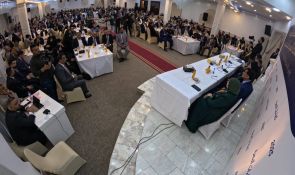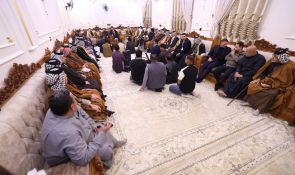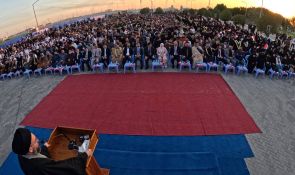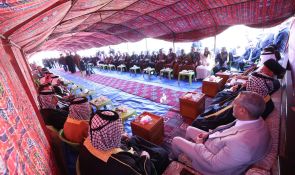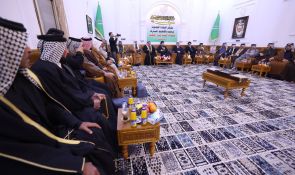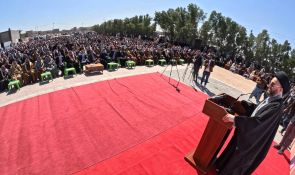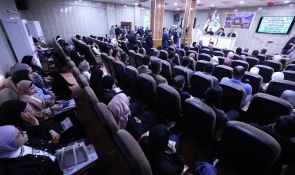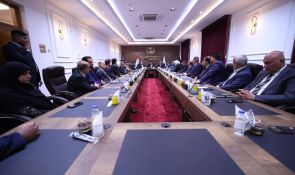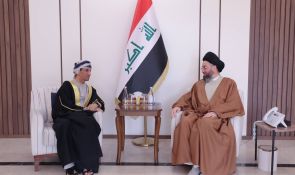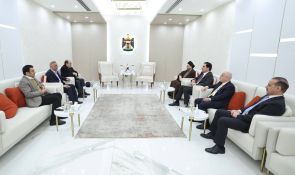SAYYID AMMAR AL-HAKIM: “Al-Zahraa (Ú) is distinctive in all her stages and roles.”
I renew my condolences on the anniversary of the martyrdom of our truthful purified Lady Fatima al-Zahraa (Ú)…
The talk about al-Zahraa, this brilliant, shining and distinctive personality in the history not only of Islam but of the history of all mankind, is broad, and whenever we point out one of the secrets of this giant personality, we find a sea of secrets, and this is the secret deposited in al-Zahraa (Ú).
Al-Zahraa is the role model of mankind, all mankind, the men and the women altogether, but no matter what we talk and say, this vision will remain limited and deficient before a great and big personality such as that of al-Zahraa (Ú). If we want now to put a mark on one of her characteristics, we can say that one of them is distinction: she was distinctive in all her stages and roles…
Distinction of al-Zahraa (Ú)…
When the clot was completed, it was distinctive: It was from the fruits of Paradise. The heavens interferes so this clot may emerge. Al-Zahraa entertains her mother while still a fetus in the womb of her mother, another miracle to be added to those of Lady al-Zahraa (Ú)…
The birth and its circumstances, the righteous women who attended the birth also were distinctive in al-Zahraa’s reality…
The growth, too, was distinguished with challenges and difficulties…
The role of Lady al-Zahraa in looking after her father, the Messenger of Allah (Õ), was a distinctive role, so much so that she was given the title of “Mother of her Father”…
Role of al-Zahraa, the circumstances of marrying Ali (Ú) and the interference of the heavens in all this process also pointed out to a sort of great and important distinction…
For her to be the guardian of Divine Imamate, the vessel for the extension of the theory of accepting the mastership of Ahl al-Bayt (Ú) through her sons, al-Hassan and al-Hussain and the offspring of al-Hussain (Ú), is a distinction in the personality of al-Zahraa…
She was a scholar, a jurist and an observer to whom people refer and whom she answers. The Messenger of Allah (Õ) used to visit her. A questioner would come to ask about ideological, doctrinal, juristic, religious, social, cultural in the broad sense, so the Messenger of Allah (Õ) would direct him to go to Fatima’s house for the answer. Of course, the Prophet was not unable to answer, but he wanted to firm this principle and to explain to what an extent al-Zahraa the woman could reach in her perfection and in her reality; this is a message.
It is the will of Allah Almighty that the progeny of the Messenger of Alah should extend through his daughter as other’s progenies extend through their sons. “Our sons are the sons of our sons, and our daughters’ sons are distantly related men” except when it came to the Messenger of Allah (Õ) whose progeny extended through his daughter al-Zahraa in another Divine miracle of those for whom He chose Fatima… So, distinction accompanies al-Zahraa in each step, in every situation, along every path, till the moment of the demise of the Prophet (Õ). There was distinction there, too, when he (Õ) confided in her, so she smiled and feels happy as she was beside the Messenger of Allah at the time when he was leaving this life and when he told her that she was the first to join him from among his relatives, so she was happy and pleased by the thought that the separation from the Messenger of Allah (Õ) would not last long.
Here, we find her distinguished even when it comes to injustice. There are three timings for the martyrdom of Lady al-Zahraa: 40, 75 or 95 days after the demise of the Prophet (Õ). The date of martyrdom of a personality the size of the daughter of the greatest Prophet is not clear, is not known; what injustice is this, what message for history is it? Where is her grave? The texts do not point and emphasize one site for her grave. Her grave, too, is unknown. There are many possibilities that it is in the Baqee`, or it may be beside the grave of the Messenger of Allah at her house which was at the time adjacent to the Prophet’s Mosque, or it is located somewhere else. Her grave is unknown. The timing of her martyrdom is unknown, and there are many options for it. This assigns for Fatima a distinction of a special type when she differs from others in all these details. She is meted with difference treatment. I have noticed that it is useful on a blessed day such as this that we must together review the last dialogue and the last moments which she spent with Ali (Ú) prior to her martyrdom as they both had to bear the big responsibility after the demise of
the Messenger of Allah (Õ)…
On p. 191, Vol. 43 of Bihar al-Anwar, it is written that “Fatima (Ú) was severely sick and remained 40 nights of sickness till she died (Ú).” Those circumstances of her sickness and the ordeal through which Lady al-Zahraa passed are known, when her rib was broken and a nail pierced through her chest, as is well known. “When she was eulogized, al-Zahraa started sensing that those were the last minutes of her life.” She, therefore, called to her presence Umm Ayman and Asmaa daughter of Umays and sent for Ali to come. During those moments, Ali was present beside her, and she was the one who stood by his dide in a long history during good and bad times, in hardship, in affliction, in all circumstances. At the moment of death, Ali had to be present. She said to him, “O son of my uncle! I have been eulogized, and I can see what afflicts me, but I am going to join my father this hour of an hour later, and I commend you about things that are in my heart.” Such was the last openness and frankness prior to martyrdom. So he sat at her head, getting everyone else out of the house. He got everyone out so there would be frankness, an exchange of secrets and facts. Then she said, “O son of my uncle! You have never found me lying or betraying.” She waned to extract testimony from her for her loyalty and commitment to duties and responsibilities towards the Imam and regarding their marriage. “Nor did I opposed you since I lived with you.” That is, I was obedient and committal; is that not so? Ali (Ú) said, “I seek refuge with Allah! You are most knowledgeable about Allah, the most kind, the most pious, the most generous and the one who feared Allah the most lest I should reprimand you for having opposed me.” Fatima was above opposing her husband. He (Ú) says, “You have been patient and obedient along this lengthy path, and it is hard on me to part with you.” Here, overflowing feelings between Ali and Fatima start on account of the hardship of the parting: “It is hard for me to part with you, to be without you, but it is unavoidable. By Allah, you have renewed to me the calamity of [the demise of] the Messenger of Allah (Õ); surely it is momentous that you should die and that I should lose you.” Ali (Ú) feels lonely due to parting with Fatima, the Infallible one, the zenith, the woman with such qualities who lightens her husband’s burdens. “So we belong to Allah, and to Him shall we return. What a painful calamity it is! How painful, harsh and grievous it is! By Allah! It is a calamity for which there is no solace.” The size of the calamity cannot be minimized by anything: “A calamity like nothing else.” Then they both wept, exchanged the worries and the sentiments. Then they all wept for a while. Ali took her head to his chest then said, “Tell me what your will is for you will find me do as you command.” Ali (Ú) knows that Fatima does not take and does not demand except what is right, except what Allah Almighty wants. Then she said, “May Allah reward you on my behalf with the best of rewards, O cousin of the Messenger of Allah! I commend you first of all to marry after me with the daughter of my sister Umama, for she will be for my sons just like me. Men have to have women.” Realism in her outlook, affection towards the offspring and thinking of the next step. Then she said, “I commend you, O son of my uncle, to make a coffin for me for I saw how the angels depicted it.” The heavens interferes even in the death issue, and the angels show the coffin in which Fatima is to be carried to her grave. He asked her to describe it for him, which she did, and the first coffin on the face of earth was that of Fatima (Ú). Then she said, “My will to you is that none of those who oppressed me and confiscated what belongs to me [the Fadak property] should be present during my funeral, neither they nor any of their followers. Bury me at night when the eyes are quiet and the visions are asleep.” Then she passed away (Allah’s blessings with her, her father, husband and offspring) after making these commendations. The residents of Medina let out one cry. The city almost shook due to their cries. Women kept saying, “O our Lady! O daughter of the Messenger of Allah!” Women went to Ali looking like a mare’s mane as he sat and both al-Hassan and al-Hussain were in front of him weeping. People wept when they saw them weep. Orphans’ tears deeply move the hearts, so what would you say when the orphans are al-Hassan and al-Hussain? Umm Kulthum came out wearing a veil, her outer garment dragging behind, as she kept saying, “O father! O Messenger of Allah! Now we have truly missed you in a way! Someone has met you never to part from you at all!” People assembled, sat, crowds of them, waiting for the corpse to get out so they would pray for her. Abu Tharr came out and told them to disperse since the corpse of the daughter of the Messenger of Allah would be taken out in the evening. People stood and left. Once the eyes were quiet and a good portion of the night had passed by, Ali, al-Hassan, al-Hussain, Ammar, al-Miqdad, Aqeel, Abu Tharr, Salman and a select group of Banu Hashim came out, performed the prayers for her then buried her in the depth of the night. Ali dug up around her grave a number of fake graves so that her grave would be lost among them, at least seven so some people would not recognize Fatima’s grave. Some close relatives said that her grave was leveled with the ground completely so that its location would not be known in compliance with the will of the daughter of the Messenger of Allah.
After Fatima’s burial, see what Ali (Ú) got… Martyrdom of al-Zahraa (Ú): Lessons and morals in building our reality and conduct…
When Fatima (Ú) died, the Commander of the Faithful buried her, placing no marks on her grave, then he stood and directed his face towards the grave of the Messenger of Allah (Õ) and said, “Peace with you, O Messenger of Allah, on behalf of your daughter, visitor and resident of the earth in your spot, the one for whom Allah chose a speedy reunion with you. O Messenger of Allah! My patience has run out facing the calamity, my tolerance has dissipated because of losing the Mistress of the Women of the World, but my solace is in following your Sunnah while parting with you. Just as I parted with you, so do I this day part with Fatima. I rested your head in your grave, your soul departed from your body as you were on my chest. Yes, it is in the Book of Allah that we belong to Allah, and to Him shall be our return. The trust has now been returned to you. O Messenger of Allah! For years I kept protecting Fatima after you had entrusted her to me, and now she is back to you. You now have restored what you had left with me, so my grief perpetuates, my night is dark, and worry never leaves my heart till Allah chooses for me the abode in which you now are residing.”
Here, Ali, too, is requesting a reunion with the Messenger of Allah and with Fatima. “Like a wound with pus, a worry that agitates, is what has separated us, and to Allah do I direct my complaint.” A status of bitterness can be seen in Ali’s look, but Ali tells the Prophet that al-Zahraa would be returning to him with a broken heart, with a strangulating sigh. “Your daughter will inform you how your nation looks the other way when she is wronged, so except her from the question why, and ask her about the condition which left behind. Many are the pains that fill her chest.”
A great calamity rests in the heart of al-Zahraa which she found no way to release. Who should she tell it to? Should she tell Ali whose heart is also in pain, thus aggravating his pain? She would not inform Ali while he already know it. Those other than Ali were not qualified for such a frank talk, such a revelation; therefore, al-Zahraa’s agony remains resting in her heart, and she will open her heart to her father. “She will say: Let Allah be the Judge, and He is the best of judges. Peace with you both, a greeting of one bidding you farewell like one who finds no solace, who never tires of being aware of his pain. If I depart, I do not seek a haven; and if I stay, it is not due to thinking ill of what Allah has promised those who persevere. Oh! Patience is better and more beautiful,” cries released by Ali, sighs that come from Ali’s heart: “Had it not been for the confiscators being more powerful, I would have remained here, I would have made this my hermitage. Had it not been for those who say what they say, I would have stayed her for the rest of my life. I would have made even the woman who has just lost her son cry on account of the magnanimity of the calamity, of this calamity; so, your daughter [O Messenger of Allah] is buried secretly as Allah keeps watching.”
It is painful for Ali (Ú) to bury Fatima (Ú) secretly. Allah is the Witness; He knows how the daughter of His Messenger is buried secretly, how what belongs to her is confiscated, how her inheritance is seized so soon. “It is to Allah that I complain, and in you, O Messenger of Allah, do I find the best of solace, Allah’s blessings with you and with her is the Garden of Ridwan.”
This is one norm of distinction in the personality of Fatima (Ú). In such circumstances, calamity and pain, the openness, revelation and sentiments accurately assess the situation. They become subjective as they evaluate things, highly trusting in Allah Almighty. Such are the sentiments of Ali (Ú) as he parts with Lady al-Zahraa (Ú). These are great lessons from which we withdraw benefits in our outlook towards our Imams (Ú). We benefit from them in building our reality, in our conduct, in our life, for they are our role models, the ones whom we emulate.


